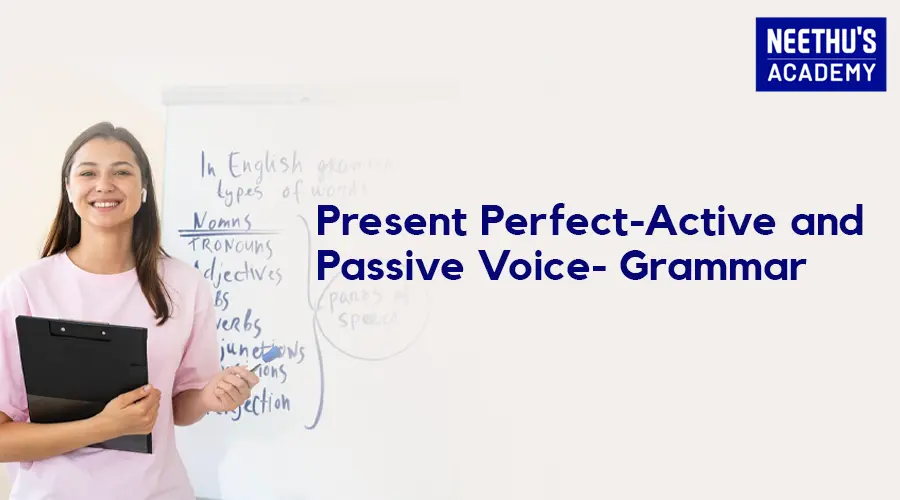Present Perfect-Active and Passive Voice- Grammar
Many people struggle with the present perfect tense, particularly in competitive exams, due to its complexity and specific usage rules. Despite its name, which can be misleading, the present perfect tense describes actions from the past that are relevant to the present moment.
Recognizing the present perfect tense is straightforward: it employs the auxiliary verbs “have” (for subjects like I, you, we, they) and “has” (for he, she, it), followed by the past participle of the main verb.
For instance, consider the sentence, “I have been swimming since childhood.”
The importance of understanding this goes beyond its use in competitive exams.
Mastering the present perfect tense is crucial for effective communication in both written and spoken English. This tense allows speakers to connect past actions or events with the present moment, providing context and clarity that other tenses may not convey.
Present Perfect Active Voice
The present perfect active voice describes an action that occurred in the past but is connected to the present. It is easily recognized by the use of the auxiliary verbs “have” (for subjects like I, you, we, they) and “has” (for he, she, it), followed by the past participle of the main verb.
For example, “I have been swimming since I was a child”.
Key Characteristics
Here are the main features:
1. Auxiliary Verbs Used:
“Have” for subjects “I, you, we, they”
“Has” for “he, she, it”.
Past Participle: The main verb is in its past participle form
2. Comparison with Present Perfect Continuous Active Voice
You could get confused between the present perfect active voice and the present perfect continuous active voice. There is a difference between the two, wherein:
The present perfect active voice highlights the effects of the action, for example – “I’ve taught in XYZ school my whole life.”
The present perfect continuous active voice highlights the duration of the action, for example – “I’ve been teaching in XYZ school my whole life.”
- When you need to describe actions that have happened multiple times in the past and may happen again. In such cases, you must use the present perfect active voice.
For Example:
“I have visited the Taj Mahal five times!” The use of the present perfect active voice suggests that you are likely to visit again.
Usage and Examples
When to use the present perfect active voice:
1. Ongoing Actions
The present perfect active voice is used for actions that started in the past and are still ongoing. It establishes a relationship between past and present events, with relevance given to the effects of the past on the present.
Examples:
“The English lecturer has taught at the university for 10 years.”
2. Recent Actions
For actions completed very recently, use adverbs like “just” or “now.”
“Greg shouldn’t play anymore because he has just come back from his coaching.”
3. Reflect Changes Over Time
Use the present perfect active voice to highlight changes that have happened over a period of time.
“My son has become an expert in chess since he played with the professionals.”
4. Uncompleted Actions Expected to Be Finished
Use the present perfect active voice to describe actions started in the past but not yet completed, often using “yet.”
“The family has not reached its vacation destination yet.”
5. Present Perfect – Active Voice for Negatives
For negative statements, add “not” or “never” after the auxiliary verb.
“I have not studied well for the exam.”
“I have never met anyone like you.”
Also Read: How to Improve Your German Listening Skills?
Present Perfect Passive Voice
The present perfect tense in passive voice highlights past actions that are relevant to the present. In such cases, the sentence does not highlight the doer. It lays stress on the action. Let us look at some examples:
- When the doer is not known, for example, “An exceptional meal has been served for the guests.”
- To focus on the action’s recipient, for example, “Only Josh has been capable of jumping as high as an Olympic athlete.”
When to Use Passive Voice
- To state facts or general truths, for example, “Core subjects have been taught by experienced faculty for years.”
- When the agent is not specified, for example, “An extremely hard task has been completed by the writer.”
- When the agent is not important, for example, “I don’t know who has been held responsible for the theft within the premises.”
- In formal or scientific writing, for example, “The chemicals have been added to the solution to get the desired results.”
Forming Passive Sentences
Here are some tips and techniques to form passive sentences in the present perfect tense:
Convert the object of the active sentence into the subject. You must use “have/has been” followed by the past participle of the main verb. You can also use “by” to introduce the original subject or the primary agent.
Example:
Active – People have returned the money to the banks.
Passive – The money has been returned to the banks. (by the people).
Usage and Examples
For Positive Sentences:
- Active: “I have seen an awesome movie.”
- Passive: “An awesome movie was seen (by me).”
- Active: “Gregory has helped me in my studies.”
- Passive: “I have been helped in my studies (by Gregory).”
Negative Sentences:
- Active: “I have not seen the thief anywhere.”
- Passive: “The thief has not been seen anywhere (by me).”
- Active: “Many people have not visited Japan.”
- Passive: “Japan has not been visited (by many people).”
Comparison of Active and Passive Voice
Here’s a snapshot of the difference between the present perfect active and passive voice:
| Structure | Subject + have/has + past participle | Subject + have/has + been + past participle |
|---|---|---|
| Focus | Emphasizes the subject performing the action | Emphasizes the action or the recipient of the action |
| Examples | “She has written a letter.” | “A letter has been written by her.” |
| Use Case | When the doer of the action is important | When the action or the receiver is more important than the doer |
| Forming Questions | Have/Has + subject + past participle? | Have/Has + subject + been + past participle? |
| Examples (Questions) | “Has he completed the report?” | “Has the report been completed by him?” |
| Forming Negatives | Subject + have/has + not + past participle | Subject + have/has + not + been + past participle |
| Examples (Negatives) | “They have not seen the movie.” | “The movie has not been seen by them.” |
Understanding these differences helps in choosing the appropriate voice for various contexts, enhancing clarity and emphasis in communication.
Conversion Rules for Active and Passive Voice
Here are the conversion rules to change sentences from active to passive voice in the present perfect tense:
| Tense | Voice | Simple Tense | Continuous Tense | Perfect Tense | Perfect Continuous Tense |
|---|---|---|---|---|---|
| Present | Active | Sarah studies English | Sarah studied English | Sarah has studied English | Sarah has been studying English |
| Passive | English is studied by Sarah | English is being studied by Sarah | English has been studied by Sarah | No Passive | |
| Past | Active | Sarah studied English | Sarah was studying English | Sarah had studied English | Sarah had been studying English |
| Passive | Sarah studied English | English was being studied by Sarah | English had been studied by Sarah | No Passive | |
| Past | Active | Sarah studied English | Sarah will be studying English | Sarah will have studied English | Sarah will have been studying English |
| Passive | Sarah studied English | No Passive | English will be studied by Sarah | No Passive |
Tips for Proper Usage
Here are the Conversion Guidelines with Present Perfect Tense Active and Passive Voice examples and tips:
- Swap the subject and object.
- Convert the main verb to its past participle form.
- Use the appropriate auxiliary verb to maintain the tense.
- Insert “by” before the original subject.
- Include adverbs from the active sentence in the passive sentence.
Common Mistakes to Avoid
Here are some common mistakes you must avoid:
- Using the incorrect Subject-Verb Agreement:
- Incorrect: “A cricket game were won by me.”
- Correct: “A cricket game was won by me.”
- Using Misplaced Adverbs:
- Incorrect: “The match was won already.”
- Correct: “The match has already been won.”
- Unnecessary Use of Passive Voice:
- Incorrect: “Articles were written by us.”
- Correct: “We wrote the articles.”
- Misusing Prepositions
- Incorrect: “The onions were chopped by the chef.”
- Correct: “The onions were chopped into pieces by the chef.”
- Incorrect Past Participle Forms
- Incorrect: “The email was send by Alexa.”
- Correct: “The email was sent by Alexa.”
Wrapping Up
Using the present perfect tense in active and passive forms can be complicated. Referring to this guide, and understanding basic grammar rules can be quite effective for clear and effective communication. Moreover, such rules help you in integral sections like reading, writing, speaking, and listening, when preparing for key competitive examinations.
At Neethu’s Academy, we not only provide detailed lessons and practice materials but also offer personalized coaching to help you master the nuances of English grammar. Contact us today to enhance your grammar skills and achieve your academic and professional goals
Frequently Asked Questions





